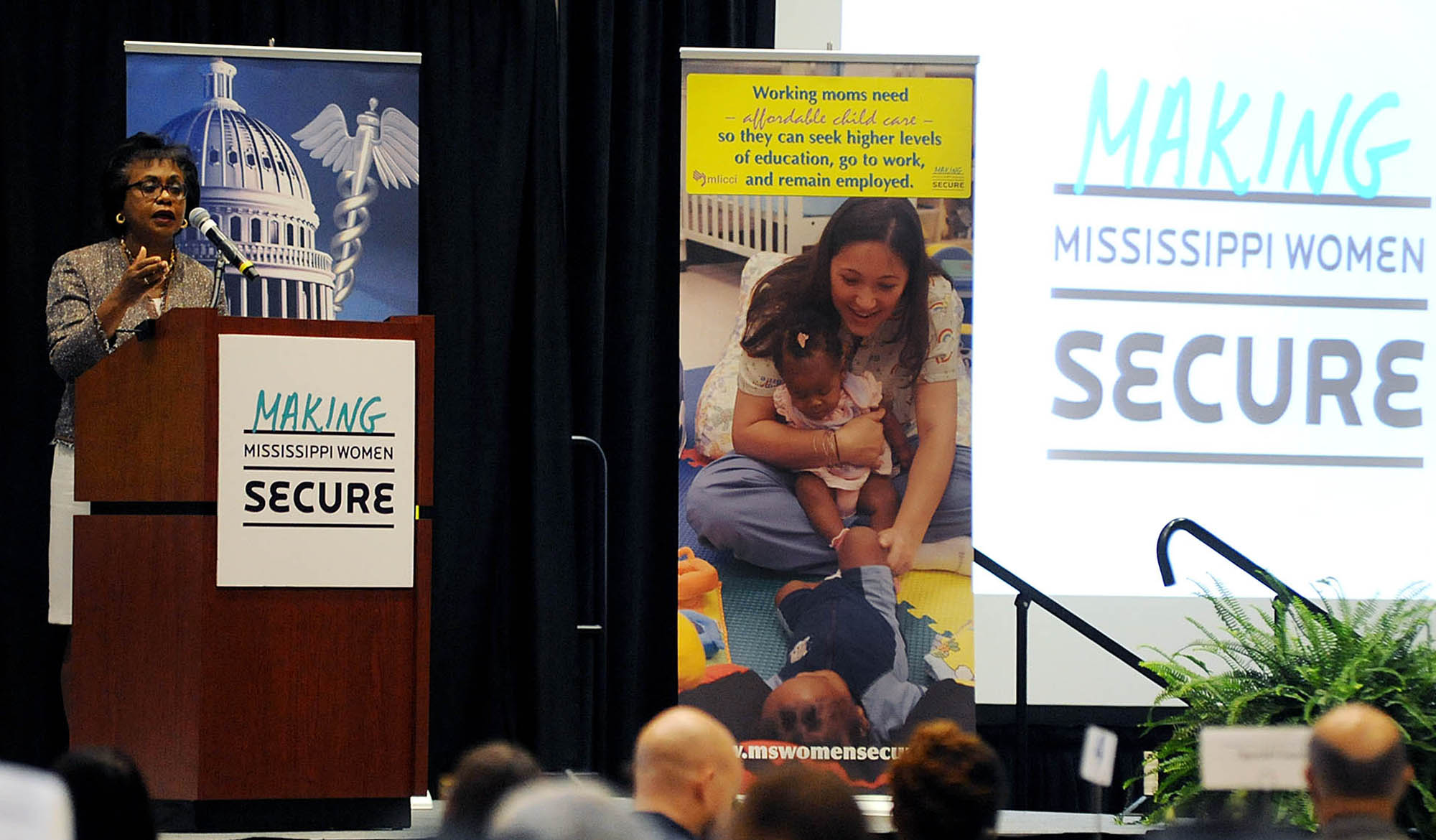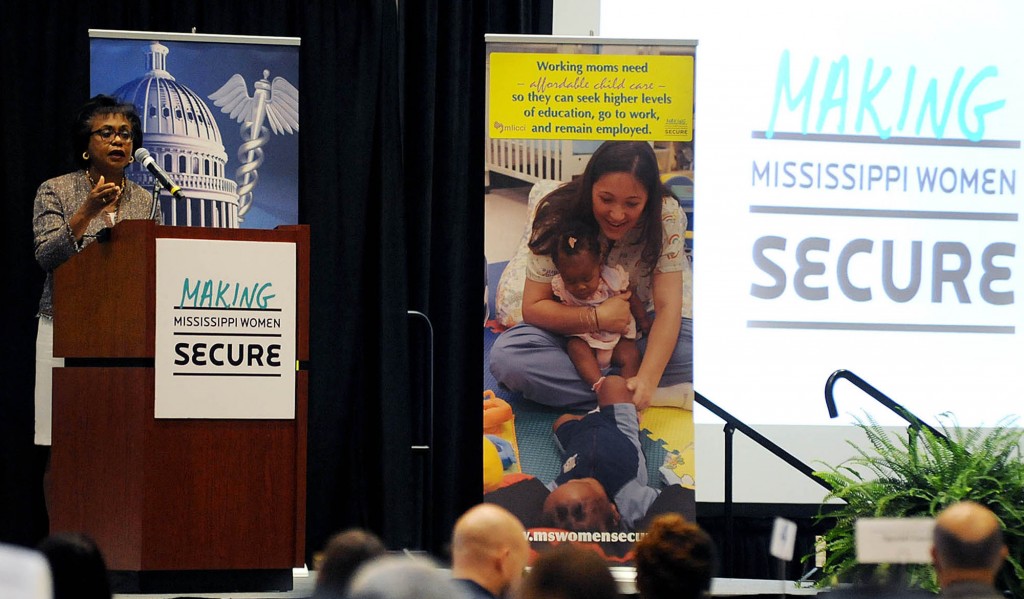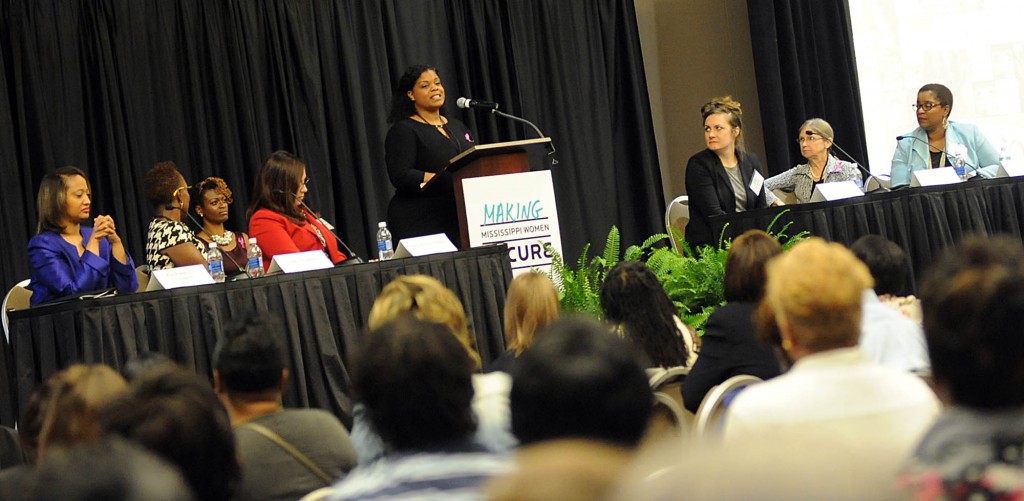
By Natalie Bell
Contributing Writer

Hundreds of women from around the state boarded buses and vans to get to Jackson for a daylong summit, held October, 10, that focused on the need for affordable childcare and higher wages for working mothers in Mississippi, issues highlighted in an address by women’s law scholar Anita Hill.
Many of the more than 500 attendees at the summit had gathered at smaller town hall meetings, earlier in the year, in Biloxi, Natchez, Indianola, and other communities – where low-wage, working mothers spoke frankly about the challenges they face trying to attain economic security.
If you want change, you just can’t keep distinguishing yourself as different from people who don’t look like you,” state Rep. Kimberly Campbell (Dist. 72) told women at this statewide summit held at the Jackson Convention Center, challenging perceptions about women in a lower-income bracket. Campbell, who represents Hinds and Madison counties, urged attendees to call their state representatives in support of a push to get a policy agenda in the hands of legislators, called Making Mississippi Women Secure (http://mswomensecure.org/). The campaign, with a growing social media presence labeled #mswomensecure, is a project of the Mississippi Low-Income Childcare Initiative, or MSLICCI (http://mschildcare.org/).
Kenisha Potter Stevenson, a Jackson-area social worker, offered a personal testament about her own struggle, underscoring statistics portraying a dismal picture delivered by a high-powered panel of experts.
“I haven’t always been a full-figured woman of confidence,” said Stevenson, adding, on second thought, “Well I’ve always been full-figured, but not confident.”
“There was a time in my life when I felt really small and unimportant,” she said. “I was just a poor, black child, born to a poor, black child, bearing another poor, black child.”
As part of the “Making Mississippi Women Secure” campaign, Stevenson has spent the last several months counseling young mothers caught in the same pattern of poverty into which she was born. She said the experience of working with other women to make more women economically secure has given her greater confidence to continue working to improve her own circumstances.
Though she started out young, unmarried and pregnant, taking WIC and Medicaid to support her child, she kept a job – bringing her child with her to work when she couldn’t afford childcare. She managed to attain professional status and, along the way, earned two college degrees in social work. However, she was careful to conclude, “While education has lessened my struggle, it didn’t alleviate it.”
Making childcare affordable to more low-wage, working women by requiring the state Dept. of Human Services to eliminate a waiting list for financial assistance, is a primary goal of the “Making Mississippi Women Secure” initiative, but that’s not all. Advocates will be seeking a meeting with state lawmakers to discuss expanding financial aid for single moms who want to achieve higher goals in education.
Support for their campaign comes from the MS Foundation for Women, the Foundation for a Just Society, the Mary Reynolds Babcock Foundation and the Marguerite Casey Foundation.
MLICCI, organizer of the campaign, has joined a national movement, whose partners include the Center for American Progress and the National Women’s Law Center.
The mostly female audience at the October 10 summit in Jackson included men, and all of the attendees represented a variety of professions and businesses.
Dr. Shonda Lawrence, an associate professor in the School of Social Work at Jackson State University, cited a Census finding of 49-percent of working families in Mississippi headed by women. She compared that to a survey, by the Mississippi Economic Policy Center, that found 64-percent of families living in poverty in the state headed by single females.
“That means that most female heads-of-household in Mississippi are at poverty level – working for low wages, with little or no access to affordable childcare, or a better job,” said Lawrence. “We need right-now solutions to right-now problems.”
Summit attendees included college students, who had screened a film about Anita Hill’s pivotal role in exposing gender inequality, when she testified that she was sexually harassed by U.S. Supreme Justice Clarence Thomas, during his 1991 confirmation hearings. The film, “Anita: Speaking Truth to Power,” was shown at the University of Mississippi Law School, and at Jackson State University, as part of the “Making Mississippi Women Secure” campaign.
In her address to the summit, Professor Hill connected the plight of low-wage, working women to the national mortgage crisis, citing research from her 2012 book, Reimagining Equality: Stories of Gender, Race and Finding Home.
“Women are more likely to spend 50-percent of their income on housing, which makes them more vulnerable to homelessness,” said Hill.
“This is about making women secure in their own homes.” The fastest-growing group of homeless people in the nation are women-headed families, she explained.
Cassandra Welchlin, who works with childcare centers throughout Mississippi, as director of childcare matters for MLICCI, collaborated with local, state and national organizations to develop the policy agenda for “Making Mississippi Women Secure.” She is also a current W.K. Kellogg Foundation Fellow.
She grew up in Jackson, graduating from JSU, then moved to Boston to obtain a master’s degree in social work at Brandeis University, where Anita Hill teaches law and women studies. Welchlin took a class with Hill in 2003.
“It was transformative,” she said of her experience studying under Hill. “It revolutionized how I would think about the practice of social justice policy, and helped me to recalibrate how I think about my experience as a woman in this country.” She has kept in touch with Hill over the years, and counts her as a mentor.

